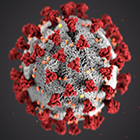Study Finds Brain Changes in Long COVID Patients With Anxiety, Depression
 A preliminary study reports that people with long COVID who experience anxiety and depression months after a mild case of COVID-19 may have brain changes that affect the function and structure of the brain. The study will be presented at the American Academy of Neurology's 75th Annual Meeting in April.
A preliminary study reports that people with long COVID who experience anxiety and depression months after a mild case of COVID-19 may have brain changes that affect the function and structure of the brain. The study will be presented at the American Academy of Neurology's 75th Annual Meeting in April.
"There is still much to learn about long COVID, which includes a wide range of health problems, including anxiety and depression, months after infection," said Clarissa Yasuda, MD, PhD, of the University of Campinas in São Paulo, Brazil. "Our findings are concerning, as even people with a mild case of COVID-19 are showing changes in their brains months later. More studies are needed to hopefully identify treatments to prevent any long-term effects on people's quality of life."
The study involved 254 people with an average age of 41 who had a mild COVID-19 infection an average of three months earlier. Participants completed tests to assess symptoms of depression and anxiety. A total of 102 people had symptoms of both anxiety and depression and 152 people had no symptoms.
Participants also had brain scans. Researchers looked at damage to the brain's gray matter to determine if there was brain shrinkage. They also compared the brain scans of the people with COVID-19 with the scans of 148 people who did not have a COVID-19 infection.
The people with COVID-19 and anxiety and depression had shrinkage in the limbic area of the brain, which plays a role in memory and emotional processing, while the people who had COVID-19 without anxiety and depression and the people without COVID-19 had no brain shrinkage.
Researchers also looked at brain function and changes in connectivity—how the brain communicates—between areas of the brain. Using a special type of software to analyze brain networks with resting-state brain activity, they looked at 84 people from the asymptomatic group, 70 people from the anxiety and depression group, and 90 people who did not have COVID-19.
Researchers found that the group with both symptoms of anxiety and depression had widespread functional changes in each of the 12 networks that were tested, while the group without symptoms showed changes in only five networks.
"Our results suggest a severe pattern of changes in how the brain communicates as well as its structure, mainly in people with anxiety and depression with long COVID syndrome, which affects so many people," Dr Yasuda added. "The magnitude of these changes suggests that they could lead to problems with memory and thinking skills, so we need to be exploring holistic treatments even for people mildly affected by COVID-19."
A limitation of the study was that symptoms of anxiety and depression were self-reported, so people may have misjudged or misreported symptoms.
The study was supported by the São Paulo Research Foundation.
Related Articles
Citation
Study Finds Brain Changes in Long COVID Patients With Anxiety, Depression. Appl Radiol.
February 21, 2023